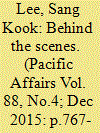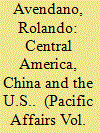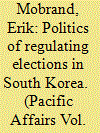|
|
|
Sort Order |
|
|
|
Items / Page
|
|
|
|
|
|
|
| Srl | Item |
| 1 |
ID:
142069


|
|
|
|
|
| Summary/Abstract |
This study shines light on behind-the-scenes informal economic activities in the Thailand-Myanmar borderland, with a focus on unauthorized riverbank Burmese merchants, the cross-border movement of goods, and the nexus of ethnic politics and border trade. issue_image_88_4_ Border Trade by Boat_LeeAlthough unauthorized trade is labeled as “smuggling” by the state, it is withi chiwit, a “way of life,” for Burmese merchants on the riverbank and even recognized by local state agencies. The decision to smuggle is made rationally and deliberately by the merchants as part of their life trajectories, while smuggled goods cater to the needs of local people and are deeply integrated into the economy of the border towns. The cross-border movement of goods by boat also demonstrates that informal ways are still alive and facilitating border trade. It further shows that the ordering of the border is not entirely regulated by state agencies but by other social groups as well, notably ethnic groups.
|
|
|
|
|
|
|
|
|
|
|
|
|
|
|
|
| 2 |
ID:
142071


|
|
|
|
|
| Summary/Abstract |
Central America remains among the poorest sub-regions of Latin America, and many Central American countries are among the hemisphere’s most dependent upon primary-product exports. Unlike other commodity exporters in Latin America, however, Central American countries have not benefited from booming Chinese demand for primary products. We use a series of measures to assess Central American countries’ trade structure, and find that they face increasing competition from Chinese products in third country markets (like issue_image_88_4_Central Am China US_bananas_costa rica_AvendanaMexico) but also little complementarity with Chinese demand (unlike Argentina or Chile). Central American countries continue to be very dependent upon the US market for exports—and, to a lesser extent, for foreign direct investment and foreign aid inflows—though dependence upon the US has slipped even as most of the countries in the sub-region have entered into a preferential trade agreement with the US. The pattern of exports has shifted from agricultural to assembly plant manufactures in several countries, and Costa Rica now exports sophisticated manufactured products to the US and China alike. We explore the role that diplomatic relations may have played in Central America’s tepid China trade: all Central American countries save Costa Rica (since 2007) recognize Taiwan and not the People’s Republic of China. We end with some considerations of development strategies in the region.
|
|
|
|
|
|
|
|
|
|
|
|
|
|
|
|
| 3 |
ID:
142073


|
|
|
|
|
| Summary/Abstract |
A recent Pacific Affairs special issue explores key dimensions of the discipline/area studies divide in the context of Southeast Asia. It asks whether it is possible to use the comparative methods favoured by disciplines while doing justice to the rich nuance of individual cases. We offer a practical perspective on this debate. We argue that the demands of discipline audiences and area-studies audiences can vary significantly, making it difficult to effectively address both within a given project. Furthermore, while individual scholars retain agency over the nature of their research, structural factors like the job market and tenure requirements nudge junior scholars towards disciplinary audiences. We support this claim with an analysis of several academic job markets across the social sciences and humanities. We also interview several junior scholars who focus on Southeast Asia to examine the channels that link structural factors with scholarly orientations, finding both direct and backchannel connections. We conclude that in the absence of structural changes to the hiring and promotion practices at major universities, the question of an ideal balance between comparative approaches and deep area nuance will be answered by practical—rather than ontological or normative—concerns.
|
|
|
|
|
|
|
|
|
|
|
|
|
|
|
|
| 4 |
ID:
142070


|
|
|
|
|
| Summary/Abstract |
Establishing an effective legal framework for regulating elections is widely considered a priority for new democracies. Electoral regulation, though, can be profoundly political. I examine the politics of electoral regulation in South Korea. The country’s restrictive campaign laws stand in sharp contrast to the liberal values that many espouse. Given the vibrancy of South Korea’s civil society and the entrance of many former activists into party politics, it is surprising that laws continue to limit political discussion and participation during election campaigns. I shed light on this puzzle by examining the ways an established party elite appropriated predemocratic institutions of electoral governance. Restrictive election regulations have their origins decades before South Korea’s democratic transition began in 1987. I offer evidence from the evolution of campaign laws in order to demonstrate continuity in important portions of the restrictions and to suggest reasons why a group of influential actors have converged around the perpetuation of these restrictions. This study has implications for the subject of electoral engineering and for thinking about South Korea’s democratization
|
|
|
|
|
|
|
|
|
|
|
|
|
|
|
|
| 5 |
ID:
142072


|
|
|
|
|
| Summary/Abstract |
This article challenges the validity of recent suggestions that “shared history” underpins India-Australia relations through an historical analysis of little-known diplomats who worked for the Indian High Commission in Australia and the Australian High Commission in India immediately after Indian independence. Based on largely unexplored archival material from India, Australia and Canada, it argues that Australia’s racialized identity, as expressed through the “White Australia” policy, thoroughly shaped Indian perceptions of Australia. While Indian policy-makers never officially voiced their distaste for White Australia, Indian diplomats put their efforts into reshaping the image of India in Australia through travel and issue_image_88_4_Educating the Other_Modi at Australia War Memorial_Davispersonal contacts as part of an effort to educate Australia about India. Likewise, Australia’s colonial identity led it to see India and Indian foreign policy as “irrational” due to its emphasis on racial discrimination and decolonization. It is argued that, far from underpinning the relationship, colonial histories and subsequent postcolonial identities have played an important role in fracturing India-Australia relations.
|
|
|
|
|
|
|
|
|
|
|
|
|
|
|
|
|
|
|
|
|